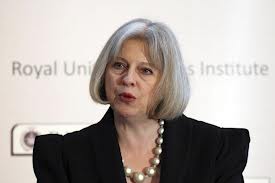The ideology of removing the Human Rights Act is based upon the premise that it is used only by crooks and criminals aiming to exploit the system.
In fact, that is essentially the idea behind every proposal to scrap something whether it be unemployment support, human rights, or working tax breaks: it works on the premise that somebody else is abusing them and so rather than fix the loopholes – they need to be severely cut or scrapped altogether for everybody.
It is the red herring that is always used when attempting to justify the total domination of an elite group of wealthy minorities over the masses.
And unfortunately this divide and rule distraction technique has proved to be very effective.
According to a poll conducted last year by the rightwing thinktank the Policy Exchange, 75 per cent of Britons believed that the Human Rights Act was a charter for criminals.
Just 16 per cent of people disagreed. Ten per cent were unsure.
The poll of 2,000 showed strong majorities among voters from all parties, including the Lib Dems. Nearly half of 18 to 24-year-olds criticised human rights, compared with 19 per cent in favour.
However, the poll itself is misleading in many ways. Leading questions such as ‘Is the Human Rights Act a charter for criminals?’ were phrased in such a way as to implant the suggestion that the Act is used only by criminals, and requested that people tick ‘yes’ ‘no’ or ‘unsure’.
The poll itself was the brainchild of a thinktank with connections to the police, CIA, Bank of England, Harvard and the Tories. Representatives of all of those named organisations have also previously appeared among the list of past speakers.
Interesting that a thinktank with connections to the CIA should unveil a survey which apparently shows that most ordinary people are against human rights. Turkeys voting for Christmas indeed.
Putting all that aside, the fact remains that one of the easiest ways for a government to scrap a ‘troublesome’ law is of course to deliberately allow the other criminals to abuse it and at the same time, cause it to be ineffective for those involved in genuine human rights stories.
This then leads people to think: “Well if the Human Rights Act doesn’t work anyway, except for criminals, then what is the point of having it? It should be scrapped”.
But then, almost in the same breath those who are inclined to believe that are quickly keen to assert their rights to ‘freedom of speech’ and giving ‘indigenous Brits more rights than others’.
Not only is the irony lost on them, but so is the realisation that a wholesale ban on human rights would be just that – the removal of rights for everybody – not just the immigrants (who are also humans).
Often the idea that we should preserve human rights is presented as a ‘lefty’ or ‘liberal’ soft-touch idea by the champagne socialists. We should of course bear in mind that it was the Conservative politician Winston Churchill who signed the Human Rights Act – also known as the European convention on human rights, in 1951. In fact, the rights set out in the Act were inspired by Churchill. They were also drafted under the guidance of another Conservative, David Maxwell-Fyfe (later Lord Chancellor Kilmuir) in the face of considerable opposition from the Attlee government. The Act should thus be regarded as the creation not of New Labour, but of the Conservative party.
These rights include the right to life; the prohibition of torture, first enacted by the Long Parliament in 1640; rights to liberty and security of person; the right to a fair trial, which dates back to the Magna Carta; the right to respect for private and family life; rights to freedom of expression and religion; and the right to freedom of association. These rights are not radical: they are deeply Conservative.
So let’s just take a look at some of the rights that would be lost if we were to remove them completely.
Right to fair trial
Under the Justice and Security Bill introduced earlier this year, courts have the mandate to hold both criminal – and civil – cases in private and prevent suspects from hearing the evidence against them. It also enhances the powers of the Intelligence and Security Committee – which was established by the Intelligence Services Act in 1994.
The government claim that secrecy is necessary for “the interests of national security” and added that protection was necessary for witnesses involved in giving evidence against the accused.
Suspects who have been excluded from secret court proceedings would be represented by a ‘special advocate’ – a security cleared lawyer chosen by the government or prosecutor, who is appointed on their behalf.
At the end of the court hearing, the person being tried may win or lose their case without knowing why, as the court’s reasoning will likely be “classified”.
In fact, a person may not even know they have been sentenced to prison at all until the police turns up at their door, under the provisions set out in this Bill.
The Bill effectively paves the way for a government authority or any “applicant” to trial individuals in this way. It is also a form of ‘disappearing’, where under a tyrannical government, law enforcement can effectively take a person to a gulag, silently in the middle of the night. In effect, it spells the end of fair and open trials in the UK.
This also paves the way for financial organisations and commercial companies to hold court cases in secret – as there is currently no provision in the law which prevents it.
This also violates Article 3 of the universal declaration of human rights.
But the European Convention on Human Rights which the tories are trying to scrap for UK citizens, makes it possible for a British citizen to challenge this arbitrary piece of legislation in UK courts without the need to go to the European Court of Human Rights in Strasbourg.
In particular, the Act makes it unlawful for any public body to act in a way which is incompatible with the Convention, unless the wording of any other primary legislation provides no other choice. If the Act were to be scrapped, this would no longer be possible.
Right to privacy
Interestingly, one of the biggest opponents of the European Human Rights Act is the Daily Mail. They of course claim it is because all of those pesky immigrants and criminals are using it to their own advantage at the expense of the hard-pressed British taxpayer.
But there may also be another reason why they (and other newspapers) are so fervently against it.
In 2008, the editor of the Daily Mail criticised the Human Rights Act for allowing, in effect, the right to privacy in English law despite the fact that Parliament has not passed such legislation. The problem was, according to Paul Dacre, was that the Act restricted a journalist’s ability to pry into the lives of celebrities and individual’s or to dig up dirt on their private, family lives or sexual preferences.
Article 8 of the Act states: Everyone has the right to respect for his private and family life, his home and his correspondence. There shall be no interference by a public authority with the exercise of this right except such as is in accordance with the law and is necessary in a democratic society in the interests of national security, public safety or the economic well-being of the country, for the prevention of disorder or crime, for the protection of health or morals, or for the protection of the rights and freedoms of others.
This of course, does not serve the agenda of the tabloid media and gutter press, who have campaigned tirelessly for this pesky little obstacle to be removed due to the negative impact it has on their ability to dig up dirt on celebrities and conduct smear campaigns against those who dare to challenge the status quo.
Freedom of speech
We are already seeing the erosion of freedom of speech in the UK. In 2010, 28 year old Paul Chambers discovered this to his detriment when he vented his fury over flight delays on Twitter caused by cold weather disruption at Robin Hood Airport in South Yorkshire.
After tweeting: “Crap! Robin Hood airport is closed. You’ve got a week and a bit to get your shit together otherwise I’m blowing the airport sky high!!” Chambers was arrested by anti-terror police who raided his home, despite the fact that airport management had said that he was “not a credible” threat.
He was later charged with “sending a public electronic message that was grossly offensive or of an indecent, obscene or menacing character contrary to the Communications Act 2003”. On May 10th, he was found guilty at Doncaster magistrates court, fined £385 and ordered to pay £600 costs. He lost his job as a consequence.
His conviction was only overturned after two high court appeals. It later emerged that staff at the Crown Prosecution Service had been in favour of dropping the case, to the point of informing Chambers, via his solicitor, that they would not oppose the final appeal, but had then been overruled by their head of service, the Director of Public Prosecutions, Keir Starmer.
In another case, Barry Thew found himself on the receiving end of the law when we wore an anti-police t-shirt with the words “one pig less, perfect justice”.
He made the statement just three hours after PCs Nicola Hughes and Fiona Bone died in a gun and grenade attack less than 20 miles away on the other side of Manchester. He was later jailed. Civil liberties campaigners said at the time that although his t-shirt was tasteless, merely wearing an offensive T-shirt should not be an imprisonable offence.
It later transpired, according to his lawyer, that Thew’s offensive attitude towards the police had arisen because he believed that they were involved in the death of his young son.
Peter Tatchell, who is campaigning for reform of public order offences, said: “Barry Thew’s t-shirt was offensive but in a free society the public should have the right to criticise – and even insult – the police. His four month jail sentence is disproportionate. No one should be jailed for a mere insult.”
In July 2012, a teenager was arrested because of his tweets to Olympic diver Tom Daley. One read: “You let our dad down I hope you know that.” A former liberal Democrat front bencher even questioned the police’s involvement. The question has to be asked: Would the police have gotten involved if Tom Daley wasn’t considered a national hero?
The case followed similarly tough sentences given to internet users who made tasteless comments, rather than threats, on Facebook and Twitter.
In 2011, police arrested Shaun Phuprate, 22, after mistaking his sign language for a rude gesture. Phuprate had raised two of his fingers to his ear in the internationally recognised sign for ‘I am deaf’.
But officers mistook the sign for a rude gesture and arrested both he and his brother Michael when he tried to intervene. But magistrates later threw out the case, saying Mr Phuprate could not possibly have understood any caution that was given or the reasons for his arrest and described his brother’s response as ‘understandable’.
Freedom to protest
Well I hate to be the bearer of bad news but the right to protest has already been eroded in the UK. In the UK, it is now illegal to protest without informing the police and other authorities in advance.
Those who fail to inform the appropriate authorities face arrest, violent crackdowns and kettling (where they are penned in by the police often for hours, and in many cases are not allowed to leave even to go to the toilet). One female protester at the G20 protests in 2009 found this out to her detriment when she asked a police officer where she was meant to go after not being allowed to leave to use the loo. The officer in question pointed to the floor in front of him and said “right here bitch”.
These are just some of the rights that would disappear if the public allowed the government to do away with them. Of course the scrapping of the Human Rights Act would be dressed up as a way to deal with immigrants and criminals, but in actual fact, it would also remove the ability for indigenous, law-abiding Britons to challenge human rights violations and discrepancies under the law. It is a fact that the British courts do not always get it right and are not always as impartial as they ought to be, particularly where the government is concerned. Therefore, the EU Human Rights Act is for many people, the last legal vestige of hope they have got. It is also the thin veil that lies between the slight freedoms that we still have, and total tyranny. However, the mainstream press has been so successful in convincing people to do away with the very protections that stand between them and total government domination, that the ordinary man and woman on the street are sadly, blissfully unaware of just how beneficial the Act can be for them; unless they find themselves in a situation where they need to use it.
Although there has been some noises about drawing up a British Bill of Rights – it is important to note that it is not just the rights themselves that are important -but the wording.
The wording of the EU Human Rights Act has been the result of many years of legal and social debates and considerations. A hastily written up British Bill of Rights may not only leave out glaring omissions, it may be drawn up in such a way as to weaken, dilute or compromise many of the fundamental freedoms and hard-won rights that citizens all over Europe have fought for. Remember these rights were drawn up in the aftermath of the Nazi occupation of Germany. History has taught us just what sort of consequences can arise when human rights are not recognised under the law.
Therefore, removing fundamental freedoms because of the mistaken beliefs that undesirables may be taking advantage of them is not only a big mistake, but a fatal one.
But is the idea of being granted rights, itself a mistake? Afterall, it gives one the impression that we are only entitled to the rights if the puppet masters governments allow us to have these rights and ratify it in law.
The problem arises of course, when they are subsequently removed or ignored. But until people decide to take the decision-making powers about their freedom away from bureaucratic governments and enforce it themselves under organised, grassroots authorities made up entirely of ordinary people, then human rights legislation is the nearest thing we have to retaining some sort of control over our lives.






















One Comment